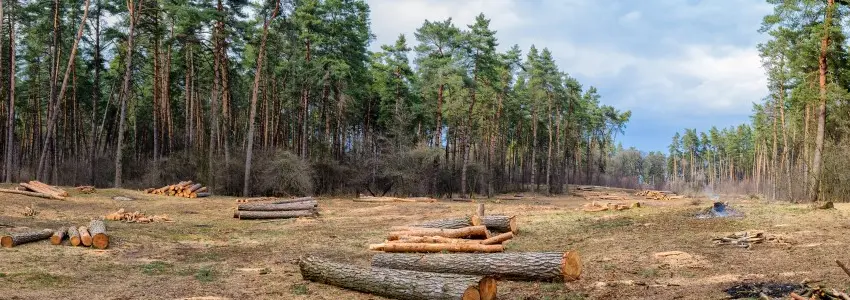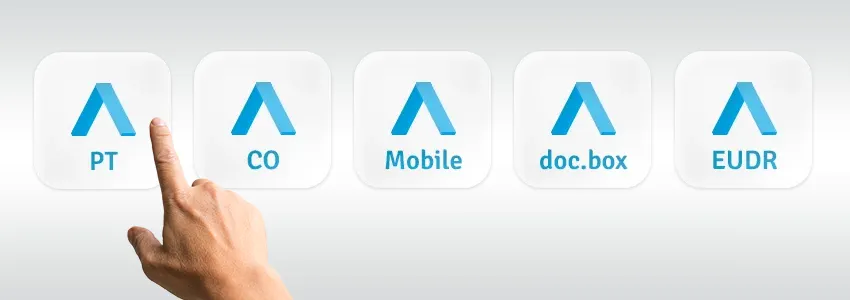
As the timber industry embraces the call for sustainability and environmental responsibility, new regulations come into focus to drive positive change. One of these is the European Union Deforestation Regulation (EUDR), which replaces the former EU Timber Regulation (EUTR). With this new regulation coming into effect on June 29, 2023, companies and traders in the industry have only 18 months to implement these new rules. At acadon, we understand the significance of this change for timber companies and are committed to supporting our customers in complying with this important regulation by integrating the required due diligence into our ERP software. In this blog, we provide a summary overview of the EUDR, delve into the actions timber companies need to take, and explain the steps acadon is taking to make the transition as smooth as possible.
Being replaced by the expansion of agricultural land linked to the production of commodities like soy, palm oil, beef, cocoa, rubber, coffee and wood, forests are disappearing globally. As a major economy and consumer of these commodities, the EU is partly responsible for this problem of deforestation and forest degradation and, therefore, wants to lead the way to solving it. With the EUDR in effect, any company or individual that sells these commodities in the EU or exports them from the EU must supply proof that the products do not come from recently deforested areas or contribute to harming the forests.
The EU has five main priorities:
1. Minimize the EU’s land consumption footprint and promote the consumption of products sourced from deforestation-free supply chains.
2. Foster collaboration with producer countries to alleviate pressures on forests.
3. Enhance international cooperation to combat deforestation and forest degradation while fostering forest restoration efforts.
4. Channel financial resources towards backing sustainable land-use practices.
5. Back efforts to improve the accessibility and accuracy of forest and commodity supply chain data while supporting research and innovation in this domain.
As mentioned before the EUDR entered into force on the 29th of June 2023. Operators and traders have until 30th of December 2024 to implement the new rules. Micro and small enterprises will enjoy a longer adaptation period, until the 30th of June 2025 to be exact.
In short, from the 30th of December 2024, for commodities falling under the regulation, they can only be sold in or exported from the EU if they meet these requirements:
1. They must not have any connection to deforestation; in other words, they should not come from recently cleared forests.
2. They need to be produced following the laws and regulations of the country in which they were made.
3. There must be a due diligence statement confirming that proper care and attention were taken to ensure compliance with the regulation.
So, what does this new regulation mean for timber companies? Here the regulation makes a difference between operators, large traders and small to medium-sized traders.
In the regulation operators are defined as companies that place relevant commodities on, or export them from, the EU market. They are obliged to:
1. Implement a due diligence system to avoid sourcing of products that are not in line with the regulation. This includes gathering data on your product’s supply chain, including geographic information and the time period of primary production.
2. Conduct a risk assessment of this data to determine the risk of deforestation, forest degradation and illegality associated with the product.
3. Take actions to reduce non-negligible risks to negligible levels. For example, requesting more information, scientific product testing or taking independent surveys.
Furthermore, they should publicly report their due diligence systems and the steps they have taken to ensure compliance with their obligations.
Large traders, those who are not small to medium-sized, are also obliged to do due diligence, like operators. This means that they:
1. Need to file a due diligence statement.
2. Need to check the due diligence previously conducted in the supply chain.
3. Are liable in case of breach of the regulation.
Small to medium-sized traders (SMEs) are subject to the same obligations as an operator and keep legal responsibility in case of a breach of the regulation. However, they do not have to:
1. Exercise due diligence for parts of their products that were already subject of due diligence exercise.
2. Submit a due diligence statement.
They still have to supply due diligence reference numbers obtained from previous steps in the supply chain.
Another part of the regulation that affects the steps that a timber company must take are the country benchmarks. The European Commission is creating a centralized database that will contain risk assessments for each country. When a country is determined as low risk, an operator or large trader only needs to collect information. A risk assessment and risk mitigation are not necessary then.
When a country is marked as standard risk or high risk, all three steps should be taken. Furthermore, 5% of these steps will be checked by authorities for standard risk countries and 15% for high-risk countries.
As the deadline of the implementation of the EUDR is getting closer, acadon is gaining information from several sources to make sure the steps we take with our ERP solution are the best possible for our customers. Keeping a close eye on official developments of the EUDR is part of that. More essential, however, is close contact with our customers, timber companies of all sizes, to make sure the steps we take make it as easy as possible for them to comply with the new regulation.
Since there are still quite some question marks on the concrete consequences of the EUDR on the daily work of timber companies we keep an open mind to the specific changes or additions to our ERP solution. As more and more information comes available, we will update you on the progress of our developments. Make sure to follow us on LinkedIn or subscribe to our newsletter to be the first to receive this information.
Here are some additional resources about the EUDR:





